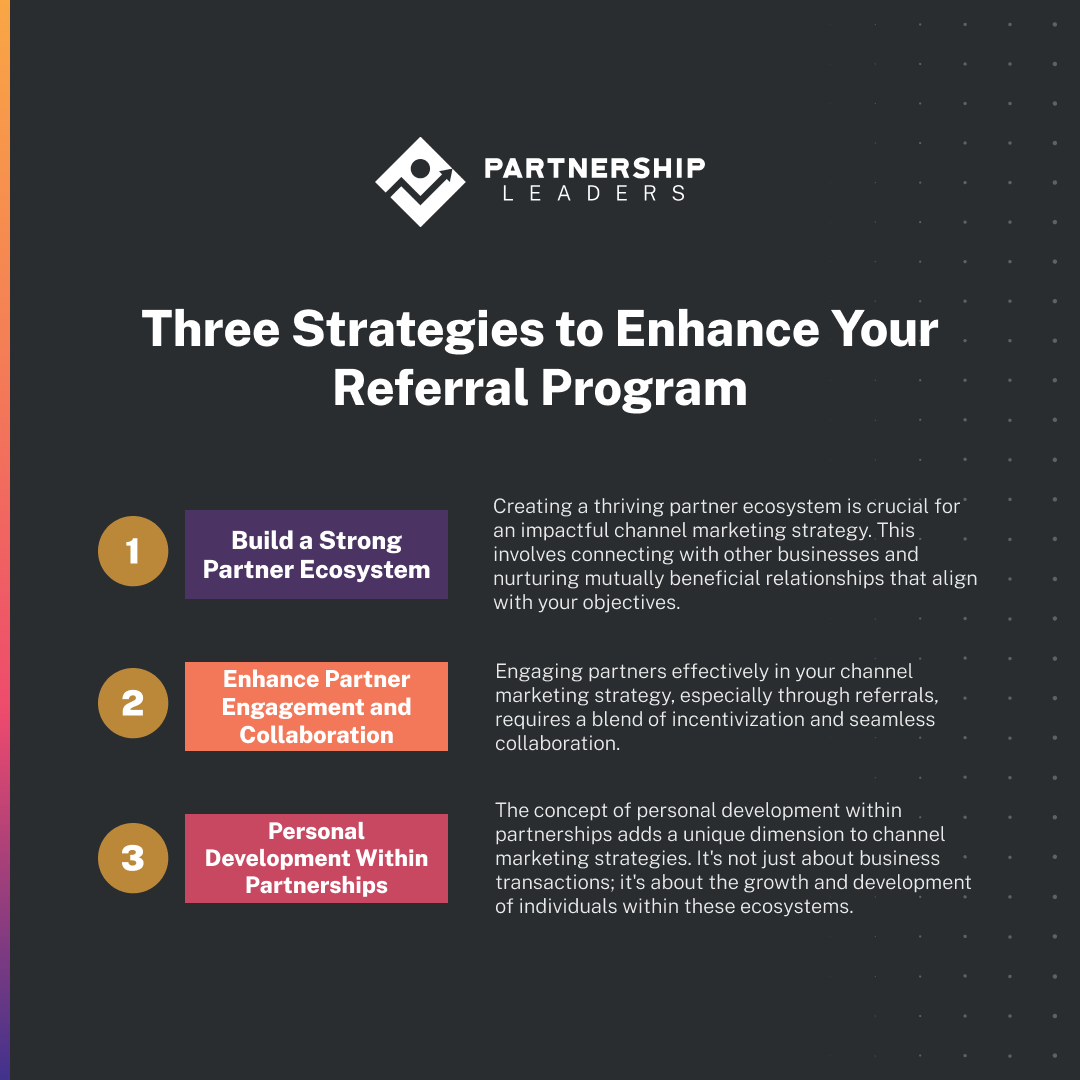When considering the vast potential of channel marketing, the power of referrals often takes center stage. A well-structured referral system within a channel marketing strategy can transform partnerships from passive connections to active growth engines.
This approach, harnessing the strength of referrals, opens up new avenues for business expansion and deeper, more meaningful collaborations. So, how do you master the art of referrals in your channel marketing strategy?
Tai Rattigan, Co-founder and COO of Partnership Leaders, dives in and explores some best practices with other industry experts.
The Role of Partnerships in Channel Marketing
At the heart of an effective channel marketing strategy lies the robust use of partnerships, mainly through referral systems.
Here’s one thing about the natural progression of successful partnerships: As these relationships deepen and grow, the generation of partner-sourced pipelines becomes a natural outcome.
Partnerships offer a unique leverage point in a world where businesses seek to maximize their reach without overextending resources. They provide access to new customer bases and markets, often with reduced direct marketing costs.
Partnerships built on a foundation of trust and mutual success also create a more sustainable business model. The focus shifts from purely transactional interactions to building an ecosystem where each entity thrives through shared goals and successes.
Three Strategies That Elevate Your Referral Game
So, how do you enhance your channel marketing strategy through referrals? Here are some insights from the discussion led by Tai.

1. Build a Strong Partner Ecosystem
Creating a thriving partner ecosystem is crucial for an impactful channel marketing strategy. This involves connecting with other businesses and nurturing mutually beneficial relationships that align with your objectives.
Mohammed Naseer Ahmed, Co-founder at eWAY, highlights the essence of this approach:
“Focusing on what customers really need is the secret sauce.”
This customer-centric mindset ensures that partnerships benefit both businesses and end-users, leading to higher satisfaction and loyalty.
To build such an ecosystem, it’s essential to:
- Identify and collaborate with partners who share similar values and goals
- Foster alignment to build trust and cooperation
- Establish clear communication channels and support systems
- Create an environment where partners feel valued and encouraged to contribute their best
As Rattigan suggests, making the referral process seamless through tools like Slack workflows and Salesforce processes can significantly enhance the ease and willingness of partners to collaborate. This streamlines operation and reinforces the commitment to mutual growth and success.
2. Enhance Partner Engagement and Collaboration
Engaging partners effectively in your channel marketing strategy, especially through referrals, requires a blend of incentivization and seamless collaboration.
Outbound Funnel Chief Revenue Officer Alexander Shyshko’s advice rings true here:
“Incentivise your reps to refer – retire quota for AEs who send referrals to partners which close, run SPIFFs for CSMs.”
Such incentives align the interests of your team with those of your partners, fostering a collaborative environment where everyone is motivated to contribute to mutual success.
Juan Manuel Garrido says you can involve your partners through:
- SKO (Sales Kick-Off) Events
- Team Trainings
- Local Events
This builds trust and creates stronger relationships and a deeper understanding of each other’s capabilities and needs. Bringing partners closer to your team’s activities helps reduce friction and enhances the likelihood of successful collaborations.
Ultimately, the goal is to create a symbiotic relationship where both parties benefit from the partnership, leading to increased opportunities and growth for all involved.
3. Personal Development Within Partnerships
The concept of personal development within partnerships adds a unique dimension to channel marketing strategies. It’s not just about business transactions; it’s about the growth and development of individuals within these ecosystems.
“Your hands-on keyboard consultants are just as important to your long-term success as your end-users,” said Oliver Walker, Co-founder of Hookflash Analytics.
He further suggests that you focus on your partner’s:
- Experience
- Onboarding
- Ease of use
- Documentation
- Celebration
- Branding
- Awards
- Pride
This approach emphasizes the human aspect of partnerships, recognizing that individual growth contributes significantly to the strength and resilience of the partnership.
In channel marketing, nurturing the career lifecycles of your ecosystem can lead to a more engaged and motivated network. Whether it’s a recent graduate starting as a consultant or a seasoned professional aiming for higher goals, each individual’s journey and development within the ecosystem should be a priority.
Encouraging partners to create ‘Professional programs’ that cater to these needs can lead to a more vibrant and dynamic environment.
Strategies for Successful Channel Marketing Partnerships
Effective strategies enhance channel marketing partnerships, especially when integrating referrals.
“Normalizing partner engagement with AEs/CSMs is super critical, have to assume most are not partner-friendly by default. Not for lack of desire, but simply form lack of exposure,” said Christopher G. Smith, Head of Partnerships at NexHealth. “Education and enablement is key.”
This insight underscores the importance of familiarizing your team with the nuances of partner engagement and its benefits.
Another crucial strategy is the bi-directional nature of partnership agreements, particularly in terms of lead generation and revenue sharing.
As Smith points out, ensuring both parties benefit from referrals and lead generation is a fundamental aspect of a mutually rewarding partnership. This approach incentivizes partners and creates a framework where both parties are invested in each other’s success.
Smith also suggests a proactive approach: “Make it clear to your Partners what they have to do in order to receive outbound referrals from you. What qualifies them to be eligible for those referrals within your program.”
Setting clear expectations and criteria for partnership engagement ensures all parties are aligned and working towards the same goals. Such clarity fosters a more efficient and effective partnership, driving growth and success for all involved.
Conclusion
The key to a successful channel marketing strategy is nurturing robust partnerships and effectively integrating referrals. Focused on mutual growth and personal development, these collaborations extend beyond transactions, creating a thriving network that drives innovation and business success. It’s about building an ecosystem where every participant contributes to and benefits from shared goals and achievements, from individual consultants to large partners.
Join The 1700+ Leaders Transforming Partnerships
As a member of Partnership Leaders you will:
- Build and learn with the top partner people at the best companies around the world.
- Increase your impact and accelerate your career with proven resources, tools, and best practices.
- Grow a network of peers, partners, and advisors with common objectives.


